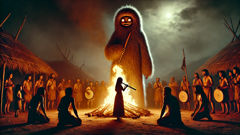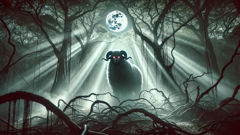Introduction
In the deep heart of Paraguay, where the forests breathe ancient secrets and the wind whispers in Guarani, the legend of the Ao Ao lingers like a shadow at dusk. For generations, villagers have recounted stories by firelight of a beast so monstrous and cunning that even the bravest hunters refused to utter its name aloud after nightfall. Known as the Ao Ao, its name a shuddering echo of its own bleating cry, this creature is said to prowl the borders of the living world and the spirit realm, always searching for its next unwitting victim. Unlike any ordinary beast, the Ao Ao is described as a grotesque, sheep-like monster with rows of sharp, yellowed teeth, hooves that crush bone and earth alike, and wool so matted and coarse that arrows and spears rebound harmlessly. Its eyes, bloodshot and rimmed with crimson, see through the thickest fog and the densest undergrowth, granting it an almost supernatural ability to stalk its prey. Yet, behind every retelling of the Ao Ao’s rampage lies something deeper: a story not only of fear, but of resilience, community, and the battle between darkness and hope. In this tale, we step into a time when the land was young, and the Guarani people’s voices rose in song and warning, weaving courage into the fabric of myth. Here, in the shadowy wilds where jaguars roam and rivers sing, one humble village will face the terror of the Ao Ao, and in doing so, discover what it truly means to stand together against the unknown.
Whispers in the Wind: The Awakening of the Ao Ao
Long before the world was divided by fences and roads, when the earth’s voice spoke through rustling leaves and the thunder’s roll, the Guarani people knew how to listen. In the fertile valleys and rolling forests near the Río Tebicuary, they built their homes from mud and reed, their days marked by the rhythm of sun and rain. But there was one sound that no one welcomed: a distant, guttural bleating that shivered the air at twilight. It was the first warning, villagers said, that the Ao Ao had awakened.

For many seasons, the Ao Ao had slept beneath a tangle of roots, deep within the forbidden forest where ancient spirits were said to dwell. Elders remembered the tale: centuries ago, when the world was young and still shaped by the gods, a spirit of vengeance was cast into the body of a ram. Twisted by fury and loneliness, it became the Ao Ao, a beast neither fully animal nor wholly spirit. Its hunger was insatiable. Its mind, cunning. And so, it prowled the borderlands, preying on those who strayed too far from the safety of fire and kin.
The year the rains failed, the ground cracked and the rivers shrank. With the drought came hunger, and with hunger, desperation. One evening, a herdsman named Lázaro found a flock of sheep torn apart on the hillside. Their bodies were left untouched except for the gnawed bones—clean as if scoured by acid. Near their remains, he found deep hoofprints, far larger than any he’d seen, pressed into the hard earth. That night, as Lázaro told his story in the communal hut, old Abuela Maricela crossed herself and whispered, “The Ao Ao walks again.”
Word spread quickly. Parents forbade their children to wander past the maize fields. Hunters sharpened their spears and painted their faces with ochre charms. By day, the village seemed normal, if a little quieter. But at night, every snapping twig and rustling shadow set nerves on edge. Dogs refused to leave their shelters, and sometimes, when the wind shifted just right, the villagers heard that chilling cry: “Ao…ao…ao…” echoing through the hollows.
One by one, livestock disappeared. A goat here, a cow there, always vanishing without a trace—except for the ever-present footprints and the faint stench of wet wool mingled with decay. Superstition thickened the air like smoke. Some whispered that the Ao Ao was drawn by anger, feeding on fear and division. Others said it was the punishment for breaking ancient pacts with the spirits of the land.
It was during this season of dread that young Naira, daughter of the village healer, made her decision. She’d always been curious and bold, her eyes sharp as a hawk’s and her heart unburdened by fear. Naira had lost her older brother to a hunting accident years before, but rather than growing timid, she’d become even more determined to protect her family and neighbors. Now, as fear threatened to tear the community apart, she resolved to confront the mystery at its source.
With her mother’s blessing and a satchel of medicinal herbs slung over her shoulder, Naira slipped away before dawn. The village lay silent behind her, its thatched roofs still silvered by dew. She followed the faint trail of hoofprints through the maize fields, past tangled brambles where fireflies hovered like lost souls, and into the forbidden forest. The air grew thick with the scent of moss and rotting leaves. Shadows pressed close, but Naira pressed on, repeating the ancient prayers her mother had taught her.
As the sun rose, slanting gold through the branches, she found herself at a clearing rimmed with ancient stones. In the center, torn tufts of wool littered the ground, sticky with blood. The silence was absolute. Naira’s breath clouded in the cool air as she knelt to examine the evidence. She saw tracks—deep, three-toed, spaced far apart—leading into a gnarled thicket. A strange unease prickled her skin, but she did not turn back.
Deeper in the woods, a sudden gust carried a familiar sound: the mournful bleating of a sheep, warped by agony and echoing through the trees. Naira’s hand closed around the hilt of her father’s old machete. She crept forward, heart hammering, until she glimpsed a flash of movement: something massive and shaggy, its coat tangled with brambles and dirt, lumbering between two ancient ceiba trees. For a moment, she caught its eyes—burning red, intelligent, filled with hunger.
She froze. The Ao Ao turned, its nostrils flaring. In that instant, Naira remembered her mother’s words: ‘All monsters have weaknesses—sometimes, what they fear most is not a weapon, but a truth.’
As the beast vanished into the gloom, Naira resolved to return home, to warn her people and seek counsel from the elders. She had seen the Ao Ao with her own eyes, and she knew: to save her village, she would need to uncover the truth behind the legend and face the monster not just with strength, but with wisdom.
The Test of Courage: Facing the Monster’s Wrath
The village of Yvyra’i braced itself. News of Naira’s encounter spread like wildfire, igniting both panic and determination among the people. Elders gathered in the central square, their faces drawn with worry and resolve. Abuela Maricela recounted the oldest verses of the legend: ‘To defeat the Ao Ao, one must stand together. To defeat the beast of the wild, one must not be divided.’ The villagers understood: courage would be their shield, unity their weapon.

Preparations began at sunrise. Men and women alike fashioned spears from sturdy guatambú wood and tipped arrows with obsidian shards. The bravest volunteered for night watches along the village’s edge. But it was Naira who, with unwavering conviction, proposed a different strategy. She spoke to the elders beneath the twisted ceibo tree, her voice steady despite her youth.
“I saw its eyes,” she said. “It’s not just hunger that drives the Ao Ao—it’s something deeper. If we only fight with weapons, we’ll lose more than our lives. We must try to understand what binds it to our land.”
Abuela Maricela nodded slowly. “The old stories say the Ao Ao was once a spirit—a guardian turned vengeful when betrayed by humans. If we can remind it of its purpose, perhaps we can break its curse.”
That night, as the moon hung heavy and pale above the treetops, the villagers lit a great fire at the center of Yvyra’i. They gathered in a circle, drums pounding like heartbeats, voices rising in ancient song. Naira stood at the fire’s edge, clutching a bundle of sacred herbs and a hollow reed flute—her brother’s old instrument.
Suddenly, the night erupted with terror. The Ao Ao charged from the shadows, eyes blazing, jaws gaping wide enough to swallow a man whole. Its woolly mass crashed through fences and huts, scattering livestock and sending villagers fleeing. But Naira did not run. Instead, she stepped into the firelight, lifting the flute to her lips.
The first trembling notes drifted across the square—soft, mournful, carrying memories of lost loved ones and broken promises. The Ao Ao hesitated, confused by the melody. Its breath steamed in the cold air as it circled the fire, uncertain. Naira played on, her heart racing, channeling every ounce of courage she possessed.
The villagers followed her lead. One by one, they emerged from their hiding places, singing the old songs and forming a protective circle around Naira. The Ao Ao’s fury wavered, its monstrous form shrinking in the glow of unity. For a moment, its eyes lost their savage light. The beast shuddered, as if torn between two worlds.
But rage surged anew. The Ao Ao reared up, roaring so loudly that the flames flickered and threatened to die. In that instant, Naira remembered her mother’s lesson: ‘All monsters have weaknesses.’ She drew a handful of sacred herbs from her satchel and cast them into the fire. A sweet-smelling smoke billowed upward, swirling around the beast.
The Ao Ao faltered. Its wool smoldered where the smoke touched it, and it bellowed in pain—a sound both animal and heartbreakingly human. Naira stepped forward, speaking not with anger but with compassion. “You were a guardian once,” she called. “You protected this land before you became a monster. Let go of your anger. Remember who you were.”
The villagers joined in, chanting words of forgiveness and hope. The Ao Ao staggered, its monstrous face contorting in agony and longing. For a moment, time stood still. Then, with a final, mournful cry, the beast turned and vanished into the forest, leaving only scorched earth and silence behind.
Exhausted but unbroken, the villagers embraced Naira, tears streaming down their faces. They had faced the beast and survived—not through violence alone, but through courage, unity, and understanding.
Echoes in the Shadows: The Aftermath and the Spirit’s Redemption
In the days that followed, Yvyra’i began to heal. The villagers repaired their homes, tended to wounded livestock, and shared meals laced with gratitude. Yet a cautious hope lingered—would the Ao Ao return? Or had the courage and compassion shown that night truly broken its curse?

Naira spent her mornings collecting herbs in the now-familiar forest, feeling both wary and oddly at peace. The woods seemed changed: lighter, less oppressive. Birds sang from hidden perches, and deer returned to graze in the clearings. Still, Naira sensed that something remained unresolved—a presence watching from the shadows.
One afternoon, as sunlight filtered through emerald leaves, she followed a winding path to the clearing where she’d first seen the Ao Ao. There, at the center of a ring of ancient stones, she found a tuft of matted wool—no longer stained with blood but sparkling with morning dew. A gentle wind stirred, carrying the faintest echo of a bleat, not of terror, but of longing.
It was then that Abuela Maricela joined her, leaning heavily on her cane. Together, they sat on a fallen log as the old woman spoke softly: “Some say curses never end. But I believe every spirit, no matter how lost, can find its way home.”
That night, Naira dreamed of the Ao Ao—not as a monster, but as a guardian spirit cloaked in white wool, standing watch over the village. In her vision, the beast’s eyes were clear and kind, and its voice was no longer a cry of pain but a song of protection.
Inspired by her dream, Naira gathered the villagers once more beneath the ceibo tree. She told them what she’d seen and felt—that perhaps, by forgiving the Ao Ao and honoring its original purpose, they could ensure peace for generations to come. The elders agreed, and so a new tradition was born: each year, on the night of the first rains, the people of Yvyra’i would gather to sing songs of courage and reconciliation. They’d light fires, share food, and remember that even the most fearsome legend can be transformed by understanding and unity.
As seasons passed, sightings of the Ao Ao became rarer and less terrifying. Sometimes, a distant bleat echoed through the hills, or a patch of wool was found near the riverbank. But these were no longer signs of doom; instead, they became reminders of the balance between darkness and light, of the need to honor both fear and hope.
And so, the legend of the Ao Ao endured—not as a tale of unending terror, but as a story of redemption. It reminded the people of Paraguay that courage means more than facing monsters; it means embracing what is unknown and finding strength in one another. In this way, the shadow of the Ao Ao became part of the land’s heartbeat—a warning and a blessing beneath the ancient stars.
Conclusion
The story of the Ao Ao lingers in the minds and hearts of Paraguay’s people, not as a simple warning of a beast in the dark, but as a testament to what communities can achieve when they choose unity over fear. Legends like this weave together history and imagination, teaching each new generation that monsters—whether real or born of myth—can be faced with wisdom, courage, and compassion. The Ao Ao’s shadow may still haunt the forests, but its tale reminds us that redemption is possible for even the most lost spirit. In every whispered story by the fire and every song beneath the stars, the people remember: courage isn’t just about fighting monsters—it’s about understanding them, and in doing so, finding the strength to heal together. The legend of the Ao Ao endures as a symbol of Paraguay’s wild heart and the unbreakable spirit of its people.













